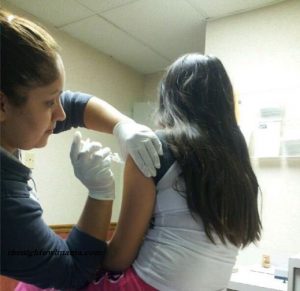May 28, 2020
By: Dwayne Page
Health officials are reminding parents about the requirements for vaccinations for students ahead of the new school year.
The DeKalb County Health Department is having a drive through 7th grade shot clinic on Monday, June 1 and Wednesday, June 3. You must call to schedule an appointment. Meanwhile if your child needs shots or an exam for pre-kindergarten or kindergarten you can call the health department and schedule an appointment time.
If your child does not get his or her shots updated in time, they may not be allowed to attend school.
Kindergartners or children enrolling in Tennessee schools for the first time need to show proof of their immunizations records.
Many parents may not realize the requirement for incoming seventh graders is proof of tetanus, diphtheria, pertussis booster (also known as T-Dap) and a Varicella vaccine booster or proof of having had chicken pox.
Immunization requirements by grade: Daycare, Pre-school or Pre-kindergarten
(Infants entering child care facilities must be up to date at the time of enrollment and are required to provide an updated certificate after completing all of the required vaccines due no later than 18 months of age.)
Diphtheria-Tetanus-Pertussis (DTaP, or DT if appropriate)
Poliomyelitis (IPV)
Measles, Mumps, Rubella (1 dose of each, given together as MMR)
Varicella (1 dose or credible history of disease)
Haemophilus influenza type B (Hib) – age younger than 5 years only
Hepatitis B (HBV) (usually completed in infancy)
Pneumococcal conjugate vaccine (PCV) – age younger than 5 years only
Hepatitis A – 1 dose, required by 18 months of age or older
Kindergarten
Diphtheria-Tetanus-Pertussis (DTaP, or DT if appropriate)
Hepatitis B (HBV) (usually completed in infancy)
Measles, Mumps, Rubella (2 doses of each, given together as MMR)
Poliomyelitis (IPV) – final dose on or after the 4th birthday
Varicella (2 doses or history of disease)
Hepatitis A (total of 2 doses, spaced at least 6 months apart)
Seventh Grade
Tetanus-Diptheria-Pertussis booster (Tdap)
One dose of varicella or credible history of disease if new to TN schools or if entering kindergarten
With your child starting seventh grade, this is also a great opportunity for him/her to get vaccinated for the human papillomavirus (HPV). The Centers for Disease Control and Prevention (CDC) recommends all kids who are 11 or 12 years old to get two shots of HPV vaccine six months apart. HPV is a very common virus. About 14 million people, including teens, become infected with HPV each year. Most people with HPV never develop symptoms or health problems. Sometimes, however, HPV infections will last longer and can cause certain cancers and others diseases. HPV vaccine is cancer prevention. It is also recommended that all 11 to 12-year-olds be vaccinated with a meningococcal vaccine as well.
New Students to Tennessee Schools
Diphtheria-Tetanus-Pertussis (DTaP, or DT if appropriate)
Measles, Mumps, Rubella (2 doses of each, given together as MMR)
Poliomyelitis (IPV or OPV) (final dose on or after the 4th birthday)
Varicella (2 doses or credible history of disease)
Hepatitis B (HBV)
New students entering grades other than 7th grade are not required to have Tdap
Full-time Tennessee college students
Measles, Mumps, Rubella (2 doses of each, given together as MMR): if born on or after January 1, 1957, only
Varicella (2 doses or credible history of disease): if born on or after January 1, 1980, only
Hepatitis B – only for health science students expected to have patient contact (before patient contact begins)
Meningococcal – At a minimum of 1 dose at 16 years of age or greater if enrolling in a public institution for the first time and under 22 years of age and living on-campus housing; private institutions set their own requirements for this vaccine
Alternative proof of immunity for certain diseases
A positive serology (year of test documented) is acceptable as an alternative to immunization for measles, mumps, rubella, hepatitis A, hepatitis B or varicella. For varicella, documentation of provider-diagnosed with varicella or provider-verified credible history of disease given by a parent or guardian is also acceptable. By documenting a history of the disease, the provider is asserting that he or she is convinced that the child has had chickenpox.
Medical or Religious Exemptions:
Children with medical exemptions must provide their child’s school with documentation from their medical provider. Religious exemptions require a signed statement by the parent/guardian that vaccination(s) conflict with his or her religious tenets or practices.




